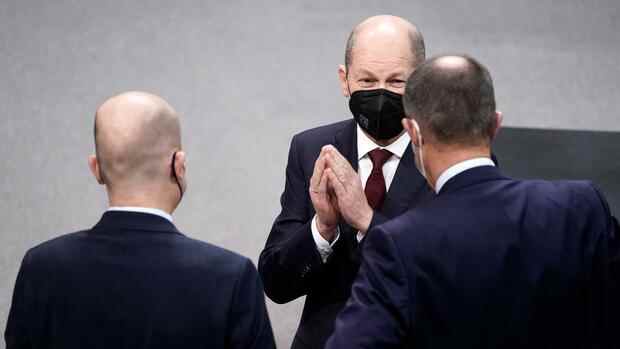The Social Democrats currently have an advantage with a freshly elected chancellor.
(Photo: imago images/Political Moments)
Of course, the first thing that comes to mind is: Oh, the irony. Merz is now doing to Ralph Brinkhaus exactly what Angela Merkel did to Friedrich Merz 20 years ago. Merz takes his old rival as a role model. The newly elected party leader is pushing Brinkhaus out of the parliamentary group chair – just like Merkel once did Merz. With the solution that has now been found, Brinkhaus’ withdrawal from the parliamentary group chairmanship, the Union is avoiding a renewed power struggle on the open stage.
The party has apparently learned its lesson, closing ranks and showing itself to be united. For a change, she has finally done everything right again: Only in the new constellation can the Union form a powerful opposition and defeat the SPD in the upcoming state elections.
In terms of power arithmetic, the Union has always ticked very differently than the SPD. While there have always been different centers of power in the Social Democrats – government, party and parliamentary group – that create identity, the Union has traditionally been completely tailored to its leader.
A separation of party and parliamentary group chair would only have worked if Merz and Brinkhaus had understood each other blindly – which they didn’t do. At the same time, Merz knows from painful experience how important the parliamentary group chairmanship is in order to set priorities in the Bundestag as the leader of the opposition. It is therefore right to combine party and parliamentary group leadership. And it is absolutely right to make this decision quickly and to appoint Merz as the new group leader next week.
Top jobs of the day
Find the best jobs now and
be notified by email.
>> Read here: Merz is the last cartridge of the CDU
The party already endured a month-long stalemate when it chose the chancellor candidacy last year – and failed miserably. Another vulture like this would have weighed heavily on the Union again in the three upcoming state elections. But now the Union can go into the election campaigns in Schleswig-Holstein, North Rhine-Westphalia and Saarland as a whole and senses the dawn again.
Merz must set a clear boundary to the right
Of course, the Social Democrats have an advantage with a freshly elected chancellor. But the previous year showed impressively how quickly the political mood can change. And the SPD didn’t win the Bundestag election because of its own strength, but to a large extent because of the weakness of the Union. And so far, Chancellor Scholz has not succeeded in fulfilling the expectations he has raised for a clearer leadership style.
The starting position for the upcoming elections is not so bad for the Union if Merz succeeds in drawing crystal-clear boundaries in the right-wing political spectrum – this includes the Maaßen cause in addition to the Union of Values - and at the same time integrating the liberal Merkel wing , just as he promised.
And Merz should also rely on Brinkhaus. Brinkhaus is an experienced financial politician, a good speaker and highly respected in the parliamentary group. He has twice demonstrated political greatness. The first time in 2018 when he had the courage to fight Volker Kauder in a seemingly hopeless campaign for parliamentary group chairmanship. And now, four years later, when he is retiring from the parliamentary group chairmanship in a truly hopeless struggle for the benefit of his own party.
In any case, it would be best for the Union faction if the dispute between Merz and Brinkhaus ended differently than that between Merz and Merkel. At least nobody knows how bitter it feels for Brinkhaus to lose the chairmanship of the parliamentary group as well as Merz himself.
More: Brinkhaus renounces parliamentary group chairmanship in favor of Merz
